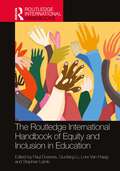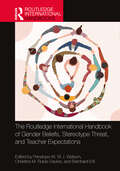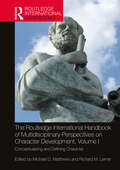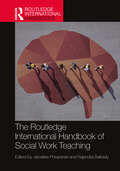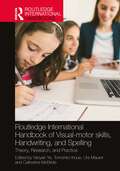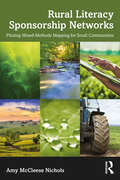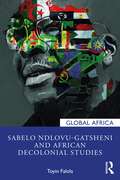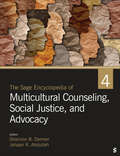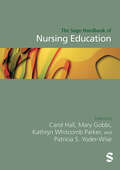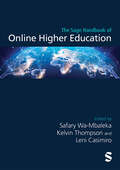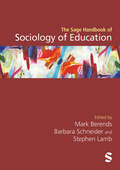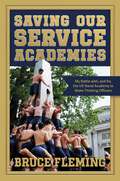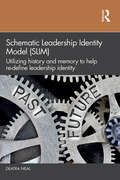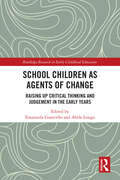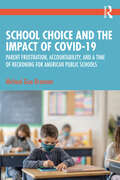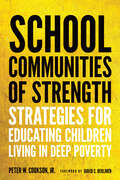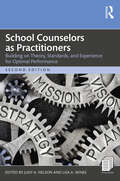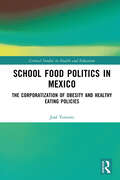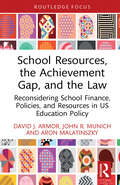- Table View
- List View
The Routledge International Handbook of Equity and Inclusion in Education (Routledge International Handbooks of Education)
by Paul Downes Guofang Li Lore Van Praag Stephen LambProviding a cornerstone to the global debate on equity and inclusion within education, this handbook explores equity issues pertaining to poverty and social class, race, ethnicity, sociocultural, sociolinguistic exclusion in education and recognises intersectionality and gender across these dimensions.This carefully curated collection of essays written by international experts promotes inclusive systems in education that explicitly recognise the voices of learners who may be at risk of marginalisation, exclusion or underachievement. Developing a multilayered innovative conceptual framework involving spatial, emotional-relational and dialogical 'turns' for education, it emphasises key system points for reform, including building strategic bridges between health and education for vulnerable groups and shifts in focus for initial teacher education and the wider curriculum.The handbook is organised into the following key parts: Theoretical Frameworks Funding Models and Structures for Equity and Inclusive Systems Exclusion and Discrimination Bridging Health and Education Agency and Empowerment Outreach and Engagement The Routledge International Handbook of Equity and Inclusion in Education will be of great value to academics operating in the areas of education, psychology, sociology, social policy, ethnography, cultural studies; researchers in university research centres and in policy institutes pertaining to education, poverty, social inclusion as well as international organisations involved with inclusion in education.
The Routledge International Handbook of Gender Beliefs, Stereotype Threat, and Teacher Expectations (Routledge International Handbooks of Education)
by Penelope W. St J. Watson Christine M. Rubie-Davies Bernhard ErtlThe Routledge International Handbook of Gender Beliefs, Stereotype Threat, and Teacher Expectations presents, for the first time, the work of leading researchers exploring the synergies and interrelationships between these fields, and provides a catalytic platform for advancing theory, practice, policy and research from an integrated perspective. An understanding of how gender beliefs, stereotype threat, and teacher expectations interrelate is vital to creating safe, equitable, and encouraging learning spaces. The collection summarises how gender beliefs, stereotype threat, and teacher expectations act in association to influence gendered student achievement, engagement, and self-beliefs, and suggests ways toward rectifying their negative effects. The chapters are organised into four sections: Gender Beliefs, Identity, Stereotypes, and Student Futures Stereotype Threat Teacher Expectations Synergies and Solutions By examining synergies and solutions shared between the three fields, this book creates more meaningful, consistent, and permanent approaches to achieving gender identity safety, gendered scholastic equity, well-being, and positive futures for students. This comprehensive publication brings together cutting-edge research at the intersection of gender beliefs, stereotype threat, and teacher expectations. It is an essential reference for researchers and postgraduate students in education and gender studies as well as educational, social, and developmental psychology.
The Routledge International Handbook of Multidisciplinary Perspectives on Character Development, Volume I: Conceptualizing and Defining Character (Routledge International Handbooks)
by Michael D. Matthews Richard M. LernerDrawing from philosophy, religion, biology, behavioral and social sciences, and the arts, The Routledge International Handbooks of Multidisciplinary Perspectives on Character Development, Volumes I and II, present cutting-edge scholarship about the concept of character across the life span, the developmental and contextual bases of character, and the key organizations of societal sectors, within and across nations, that promote character development in individuals, families, and communities.This first volume, Conceptualizing and Defining Character, explores the foundations of the field by providing an array of interdisciplinary approaches to character development, including economics, education, law, literature, military science, philosophy, and many more. With contributions from international experts, Volume I brings together cutting-edge research and discusses instances of character development, including civic character, courage, fairness, forgiveness, gratitude, morality, tolerance, and thankfulness.This comprehensive publication is an essential reference for researchers and graduate students in behavioral sciences, biology, philosophy, theology, and economics, as well as practitioners leading or evaluating character education or character development programs around the world.Find Volume II: Moderators, Threats, and Contexts here: www.routledge.com/9781032172453
The Routledge International Handbook of Social Work Teaching
by Jarosław Przeperski and Rajendra BaikadyThis handbook is a comprehensive text on social work education based on the narratives of social work educators, practitioners, and researchers from Asia and the Pacific, North and South America, Australia and Oceania, and Europe. It discusses innovations, challenges, pedagogy, and tested methods of social work teaching at various levels of educational programmes.The volume: Examines key concepts that underpin debates concerning social work teaching, research, and practice Brings out key concerns, debates, and narratives concerning various teaching, learning, and pedagogical methods from different countries Documents principal perspectives of different stakeholders involved in social work education – from educators and practitioners to novice social workers The Routledge International Handbook of Social Work Teaching will be an effective instrument in informing policy decisions related to social work teaching and pedagogy at the global and local levels. It will be essential for educators, researchers, and practitioners within social work institutions and for professional associations around the world.
Routledge International Handbook of Visual-motor skills, Handwriting, and Spelling: Theory, Research, and Practice (Routledge International Handbooks)
by Yanyan Ye Tomohiro Inoue Urs Maurer Catherine McBrideThe Routledge International Handbook of Visual-motor skills, Handwriting, and Spelling explores the potentially controversial field of early literacy education. It aims to offer scholars and practitioners an analysis of how and why handwriting skills benefit early literacy learning, especially spelling acquisition, and how this can enrich experiences for children and educators. Offering global perspectives from the field, the volume integrates current theories with up-to-date research and practice, revealing how we can best support children’s early literacy learning with handwriting and visual-motor skills interventions. Key topics covered include: The fundamentals of handwriting skills and literacy acquisition; Global literacy and spelling; Dysgraphia, handwriting difficulties, and dyslexia; Spelling and writing in the digital age; Home learning environment and spelling; Instruction and interventions for spelling and writing. This comprehensive survey will be essential reading for scholars and students of developmental psychology, education, and literacy research.
Rural Literacy Sponsorship Networks: Piloting Mixed-Methods Mapping for Small Communities
by Amy McCleese NicholsThis text provides an in-depth exploration of rural community literacy, examining the ways in which community-building, social networks, time, race, and politics interplay.Mapping the dense literacy sponsorship network of a small rural town in the southeastern United States, Nichols offers a window into the challenges and successes of collective literacy sponsorship. Through an original mapping-focused approach, the book explores multiple social and environmental layers that construct literacy sponsorship writ large.This approach provides a novel methodological entry to rural literacies and will be key reading for rural community literacy advocates, literacy scholars, graduate students, and researchers.
Sabelo Ndlovu-Gatsheni and African Decolonial Studies (Global Africa)
by Toyin FalolaThis book considers the work of the preeminent scholar on decoloniality, Sabelo Ndlovu-Gatsheni, as a means of examining the development of decoloniality discourse and considering the future direction of the African knowledge economy. Sabelo Ndlovu-Gatsheni has been instrumental in the construction of theories and ideas necessary for advancing a decolonial system of education and epistemology. This book considers how Professor Ndlovu-Gatsheni’s work has helped to shape our thinking both on Mugabe and the history of Zimbabwe, and beyond to the broader questions of race, liberation, higher education, and the future of decolonial studies. Renowned author Professor Toyin Falola then invites us to consider the dangers of continued repression of African epistemologies, and the enormous benefits of an alternative knowledge economy in which a diverse multiplicity of ideas drives our understanding of the world on to new heights. Unpacking the various conceptual leanings of decoloniality through the works of one of its leading lights, this book will be an essential read for researchers across the fields of African Studies, Race Studies, Philosophy, and Education.
The Sage Encyclopedia of Multicultural Counseling, Social Justice, and Advocacy
by Shannon B. Dermer Jahaan R. AbdullahSince the late 1970s, there has been an increase in the study of diversity, inclusion, race, and ethnicity within the field of counseling. The SAGE Encyclopedia of Multicultural Counseling, Social Justice, and Advocacy will comprehensively synthesize a wide range of terms, concepts, ideologies, groups, and organizations through a diverse lens. This encyclopedia will include entries on a wide range of topics relative to multicultural counseling, social justice and advocacy, and the experiences of diverse groups. The encyclopedia will consist of approximately 600 signed entries, arranged alphabetically within four volumes.
The Sage Encyclopedia of Multicultural Counseling, Social Justice, and Advocacy
by Shannon B. Dermer Jahaan R. AbdullahSince the late 1970s, there has been an increase in the study of diversity, inclusion, race, and ethnicity within the field of counseling. The SAGE Encyclopedia of Multicultural Counseling, Social Justice, and Advocacy will comprehensively synthesize a wide range of terms, concepts, ideologies, groups, and organizations through a diverse lens. This encyclopedia will include entries on a wide range of topics relative to multicultural counseling, social justice and advocacy, and the experiences of diverse groups. The encyclopedia will consist of approximately 600 signed entries, arranged alphabetically within four volumes.
The Sage Handbook of Nursing Education
by Carol Hall Patricia S. Yoder-Wise Mary Gobbi Kathryn Whitcomb ParkerIn the past several years, a revival of research devoted to nursing education has emerged. This emergence has changed the way many educators engage in their practice of working with learners; and learners have come to expect that they will have a rich learning experience designed to develop new (or enhance prior) knowledge, skills, and attitudes. The SAGE Handbook of Nursing Education provides a detailed map of the current discipline, with a carefully selected team of international contributors offering the latest thinking about education in nursing across key areas. This handbook will be a key resource for academic educators, as well as graduate and postgraduate learners.
The Sage Handbook of Nursing Education
by Carol Hall Patricia S. Yoder-Wise Mary Gobbi Kathryn Whitcomb ParkerIn the past several years, a revival of research devoted to nursing education has emerged. This emergence has changed the way many educators engage in their practice of working with learners; and learners have come to expect that they will have a rich learning experience designed to develop new (or enhance prior) knowledge, skills, and attitudes. The SAGE Handbook of Nursing Education provides a detailed map of the current discipline, with a carefully selected team of international contributors offering the latest thinking about education in nursing across key areas. This handbook will be a key resource for academic educators, as well as graduate and postgraduate learners.
The Sage Handbook of Online Higher Education
by Safary Wa-Mbaleka Kelvin Thompson Leni CasimiroThe SAGE Handbook of Online Higher Education presents a cutting-edge collection of 50 essays that explores the rapidly evolving landscape of online teaching and learning in higher education. Assembled and contributed by a team of leading experts, the Handbook adopts a uniquely holistic approach to examining the needs of online education. Chapters bring together voices from diverse and international backgrounds to provide insights applicable to a broad range of contexts, and present practical strategies for planning, delivering quality online higher education. The handbook covers a wide range of topics, including online pedagogy, instructional design, student engagement, technological innovation, assessment, leadership, and the developing role of online education in the context of broader societal and cultural shifts. The SAGE Handbook of Online Higher Education is an essential resource for educators, researchers, policymakers, and practitioners who seek to understand and shape the future of higher education in the digital age. Section 1: Fundamentals of Online Education Section 2: Online Education Around the World Section 3: Online Instructional Design Section 4: Online Instructional Delivery Section 5: Instructional Technology for Online Education Section 6: Online Education Administration and Management Section 7: Student Support Services
The Sage Handbook of Online Higher Education
by Safary Wa-Mbaleka Kelvin Thompson Leni CasimiroThe SAGE Handbook of Online Higher Education presents a cutting-edge collection of 50 essays that explores the rapidly evolving landscape of online teaching and learning in higher education. Assembled and contributed by a team of leading experts, the Handbook adopts a uniquely holistic approach to examining the needs of online education. Chapters bring together voices from diverse and international backgrounds to provide insights applicable to a broad range of contexts, and present practical strategies for planning, delivering quality online higher education. The handbook covers a wide range of topics, including online pedagogy, instructional design, student engagement, technological innovation, assessment, leadership, and the developing role of online education in the context of broader societal and cultural shifts. The SAGE Handbook of Online Higher Education is an essential resource for educators, researchers, policymakers, and practitioners who seek to understand and shape the future of higher education in the digital age. Section 1: Fundamentals of Online Education Section 2: Online Education Around the World Section 3: Online Instructional Design Section 4: Online Instructional Delivery Section 5: Instructional Technology for Online Education Section 6: Online Education Administration and Management Section 7: Student Support Services
The Sage Handbook of Sociology of Education
by Mark Berends Barbara Schneider Stephen LambThe Sage Handbook of Sociology of Education is an international and comprehensive groundbreaking text that serves as a touchstone for researchers and scholars interested in exploring the intricate relationships between education and society. Leading sociologists from five different continents examine major topics in sociology from a global perspective. This timely, thought-provoking Handbook features contributions from leading and emerging sociology scholars, who provide their own cultural and historical perspectives on diverse—yet universal—topics; these include educational policy, social stratification, and cross-national research. 39 Chapters delve into the pressing issues faced by our global society, such as the effects of residential mobility on educational outcomes, gender and ethnic inequalities, and the impact of COVID-19 on early childhood education. Readers will gain a multifaceted view of the contours of educational inequality, from various international perspectives and focusing on country differences, as well as recommendations for expanding the practices, programs, and policies that could reduce the rising tide of inequities—especially for populations most at risk. This Handbook offers rich, diverse perspectives on the interplay between education, social inequality, and human rights around the world, making it an invaluable resource for students, researchers, and practitioners across a range of fields, including sociology, education, and social policy. PART 1: Education and Persistent Inequality PART 2: Social & Family Contexts PART 3: Schools & Educational Policy PART 4: Neighborhoods & Community PART 5: Education & Innovation in a Global Context
The Sage Handbook of Sociology of Education
by Mark Berends Barbara Schneider Stephen LambThe Sage Handbook of Sociology of Education is an international and comprehensive groundbreaking text that serves as a touchstone for researchers and scholars interested in exploring the intricate relationships between education and society. Leading sociologists from five different continents examine major topics in sociology from a global perspective. This timely, thought-provoking Handbook features contributions from leading and emerging sociology scholars, who provide their own cultural and historical perspectives on diverse—yet universal—topics; these include educational policy, social stratification, and cross-national research. 39 Chapters delve into the pressing issues faced by our global society, such as the effects of residential mobility on educational outcomes, gender and ethnic inequalities, and the impact of COVID-19 on early childhood education. Readers will gain a multifaceted view of the contours of educational inequality, from various international perspectives and focusing on country differences, as well as recommendations for expanding the practices, programs, and policies that could reduce the rising tide of inequities—especially for populations most at risk. This Handbook offers rich, diverse perspectives on the interplay between education, social inequality, and human rights around the world, making it an invaluable resource for students, researchers, and practitioners across a range of fields, including sociology, education, and social policy. PART 1: Education and Persistent Inequality PART 2: Social & Family Contexts PART 3: Schools & Educational Policy PART 4: Neighborhoods & Community PART 5: Education & Innovation in a Global Context
Sahitya Vihara Bhaga- 1 B.A Padavige Nigadipadisida, Prathama Mattu Dvitiya Semestar Kannada Bhasha Pathya: ಸಾಹಿತ್ಯ ವಿಹಾರ ಭಾಗ-1 ಬಿ.ಎ ಪದವಿಗೆ ನಿಗದಿಪಡಿದ ಪ್ರಥಮ ಮತ್ತು ದ್ವಿತೀಯ ಸೆಮಿಸ್ಟರ್ ಕನ್ನಡ ಭಾಷಾ ಪಠ್ಯ
by Prof. Nithyananda B Shettyಸಾಹಿತ್ಯ ವಿಹಾರ ಭಾಗ-1 ಬಿ.ಎ ಪದವಿಗೆ ನಿಗದಿಪಡಿದ ಕನ್ನಡ ಭಾಷಾ ಪಠ್ಯ ಪ್ರಥಮ ಮತ್ತು ದ್ವಿತೀಯ ಸೆಮಿಸ್ಟರ್ ಪಠ್ಯ ಪುಸ್ತಕವಾಗಿದೆ.
Saving Our Service Academies: My Battle with, and for, the US Naval Academy to Make Thinking Officers
by Bruce FlemingOnce proud citadels of virtue, the US military academies have lost their way and are running on fumes. They need to be fixed before it&’s too late.Saving Our Service Academies covers one man&’s unrelenting thirty-year fight with the military bureaucracy to instill qualities of force and thoughtfulness in officers-to-be, to show young men how to be adults with other men and women, and to show young women how to deal with the men. Bruce Fleming has spent over thirty years teaching midshipmen and future officers at the US Naval Academy in Annapolis. This position was both a dream job and a nightmare for the enthusiastic, athletic, young Fleming. He found, in the thousands of midshipmen he taught, mentored, and exercised with for three decades, a heartbreaking waste of potential, as promising officers-to-be lapsed into apathy and cynicism because of the dispiriting reality behind the gleaming facade of the Naval Academy. What happened to duty, honor, and country at Annapolis? These values have disappeared in the wake of changes in the world, such as the rise of ROTC and the increase in expense of civilian colleges (the service academies are free to the students), and in the attempt to use the service academies as experiments in trendy social engineering. A staunch advocate for military strength, Fleming shows how the smoke and mirrors of service academies produce officers who are taught to say &“SIR, YES SIR&” rather than to have the guts to say things their commanding officer doesn&’t want to hear. Is that why the US hasn&’t won a war since World War II? By writing op-eds about the waste, fraud, and abuse of government (and taxpayer) money, Fleming put a target on his back that the USNA administration used to fire him in 2018, despite being a tenured civilian professor. He was reinstated by a federal judge in 2019. The service academies are government programs that no longer fill the needs for which they were created, and so like all government programs, can be re-examined. Indeed, as Fleming argues, they teach blind obedience in officers rather than informed and respectful questioning, and so sap our military strength rather than increasing it. They need to be re-imagined not as stand-alone undergraduate institutions that wall off future officers in an increasingly untenable isolation from the country they are to defend, but either be combined with the officer commissioning sources that currently produce over 80 percent of our new officers, or re-purposed to post-civilian college training institutions.
Schematic Leadership Identity Model (SLIM): Utilizing History and Memory to Help Re-define Leadership Identity
by Deatra L NealA workbook for leaders who desire to be more effective and deliberate in their leadership identity and for young leaders coming into their own, this book introduces a unique two-step process to understand and define your leadership identity. While some leadership frameworks operate under static concepts of what makes a good leader, the Schematic Leadership Identity Model (SLIM) offers new and seasoned leaders an opportunity to explore the anchoring of who they are and the ebbs and flows of their attitudes and behaviors through life’s changes and experiences. The SLIM framework has two main footings of its seven phases: revolution, which is the recognition of one’s identity journey, and the theoretical constructs that help frame the process and evolution, a series of assignments and journal entries that helps each leader acknowledge their current leadership identity, unravel habits and behaviors that may not align with their idealized self, and redefine their leadership identity based on their findings and whom they aspire to be. The evolutionary design is a system necessary to be revisited as a leader goes deeper into their memories and experiences. This framework helps unearth unconscious and implicit biases that can hinder a leader’s social and cultural capital. No matter the industry or discipline, SLIM offers leaders a self-guided process of discovery that can profoundly examine the root causes of behaviors and attitudes to create meaningful change within themselves that can produce significant positive changes in their teams and organizations.
School Children and the Challenge of Managing AI Technologies: Fostering a Critical Relationship through Aesthetic Experiences (Routledge Research in Early Childhood Education)
by Abele Longo Emanuela GuarcelloThis edited volume recognises the need to cultivate a critical and acute understanding of AI technologies amongst primary and elementary school children, enabling them to meet the challenge of a human- and ethically oriented management of AI technologies.Focusing on school settings from both the national and international level to form comparative case studies, chapters present a robust conceptual and foundational framework within a global context as the idea of AI and our relationship to it advances apace. The book uses research garnered from interviews and observational data, qualitative and quantitative research, and theoretical findings gathered from single schools or institutions across the world. Providing an innovative perspective in promoting the importance of a critical, creative and ethical orientation based on aesthetic experiences, the book focuses on development in areas like visual arts, literature, environmental education, robotics, photography and screen education, movement and play.Ultimately, the book responds to an urgent and time-sensitive call to provide guidance on AI to primary education researchers and will be of interest to academics, scholars and researchers in the fields of primary and elementary education, technology in education, children's rights education, and moral and values education more broadly.
School Children as Agents of Change: Raising up Critical Thinking and Judgement in the Early Years (Routledge Research in Early Childhood Education)
by Emanuela Guarcello Abele LongoThis edited volume promotes the capacity for critical thinking and judgement in primary school-aged children in the face of the challenges that schools encounter in today’s society. Foregrounding critical thinking and judgement as essential capacities for children to develop, each chapter offers a space for reflection on the formation of the ability to think and judge in primary school. While presenting a robust conceptual and foundational framework, chapters focus on the educational-didactic practices deemed most authoritative due to their impact on, and their innovative qualities within, the educational landscape today. Themes affecting schools in both the global north and south are discussed, such as social relationships, children’s voices, life skills and digital education, well-being and health, as well as matters of social plurality, inequalities and discrimination, ecology, global economy and the decolonising of education from various international perspectives. Foregrounding real-world experience within the education system, this book will be of relevance to researchers, scholars and post-graduates in the fields of philosophy of education, moral education and child development. It will also be of interest to pre- and in-service primary education practitioners.
School Choice and the Impact of COVID-19: Parent Frustration, Accountability, and a Time of Reckoning For American Public Schools
by Michael Guo-BrennanThrough the broad lens of political economy and centred around education reform policy, this essential book provides an in-depth analysis of the current state of American public education and the impact of Covid-19 on calls for change. Drawing upon evidence from nations that routinely outperform America, this text proposes a more holistic approach to accountability and improvement within the American public education system. Chapters explore the issues faced by the current American public education system and proposes potential solutions, including: the role of government as provider of education services; liberty, democracy, and freedom and the ability of parents to control their child’s education; growing frustration with schools, public policies surrounding Covid and other potential crises; and how these concerns will impact the school choice movement. This is an important read for researchers and postgraduate students in education, teachers, parents, public policy makers and appointed government officials who wish to improve the quality of public education. Whether for or against school choice, this book will leave you better informed on current issues of American public education.
School Communities of Strength: Strategies for Educating Children Living in Deep Poverty
by Peter W. Cookson Jr.An evidence-based plan of action to achieve educational justice for K–12 public school students from families whose income is 50% or more below the US poverty threshold
School Counselors as Practitioners: Building on Theory, Standards, and Experience for Optimal Performance
by Lisa A. Wines Judy A. NelsonSchool Counselors as Practitioners, Second Edition, is a hands-on, practice-based, task-oriented guide to being an effective school counselor.Thoroughly revised, this textbook continues to address the foundation of school counseling, the main duties of a school counselor, the skills needed to be successful, and what to expect as a school counseling professional. All these topics have been updated to include the current thinking, research and evidence-based practices, and challenges in school counseling. Additionally, interviews of principals, school counselors, and community leaders are included, which provide readers with the reality of how to navigate the waters of the comprehensive school counseling program. The chapter authors also highlight the necessity of designing, implementing, and evaluating the counseling program for continuous improvement. Online resources provide students with templates and handouts for on-the-job responsibilities, as well as quiz questions for every chapter.This updated edition is essential reading for counselor educators, graduate students enrolled in a school counseling program, supervisors of school counselors, including administrators, and practicing school counselors.
School Food Politics in Mexico: The Corporatization of Obesity and Healthy Eating Policies (Critical Studies in Health and Education)
by José TenorioIntertwining policy analysis and ethnography, José Tenorio examines how, and why now, the promotion of healthy lifestyles has been positioned as an ideal ‘solution’ to obesity and how this shapes the preparation, sale and consumption of food in schools in Mexico. This book situates obesity as a structural problem enabled by market-driven policy change, problematizing the focus on individual behavior change which underpins current obesity policy. It argues that the idea of healthy lifestyles draws attention away from the economic and political roots of obesity, shifting blame onto an ‘uneducated’ population. Deploying Foucault’s concept of dispositif, Tenorio argues that healthy lifestyles functions as an ensemble of mechanisms to deploy representations of reality, spaces, institutions and subjectivities aligned with market principles, constructing individuals both as culprits for what they eat and the prime locus of policy intervention to change diets. He demonstrates how this ensemble enmeshes within the local cultural and economic conditions surrounding the provisioning of food in Mexican schools, and how it is contested in the practices around cooking. Expanding the conversation on the politics of food in schools, obesity policy and dominant perspectives on the relation between food and health, this book is a must-read for scholars of food and nutrition, public health and education, as well as those with an interest in development studies and policy enactment and outcomes.
School Resources, the Achievement Gap, and the Law: Reconsidering School Finance, Policies, and Resources in US Education Policy (Routledge Research in Education Policy and Politics)
by David J. Armor John R. Munich Aron MalatinszkyThis book offers a novel and up-to-date exploration of the common belief that increasing conventional school resources will increase academic achievement and help close gaps between various advantaged and disadvantaged students. Taking the scholarship around this question, such as James S. Coleman’s 1965 report on the Equality of Educational Opportunity, as a starting point, it brings in an extensive range of contemporary data sources and statistical analysis to offer an updated, robust, and considered review of the issue. Moving beyond these empirical questions, it also explores how these empirical findings have been utilized in “education adequacy” litigation, discussing the evolving law of adequacy cases, while explaining the challenges of introducing complex data and analyses within a litigation framework. Judges typically have little experience with the complexity of modern education data and the analyses required to draw sound inferences. It will thus be of interest to scholars, researchers, and faculty with expertise in education policy, the economics and sociology of education, and public policy.
